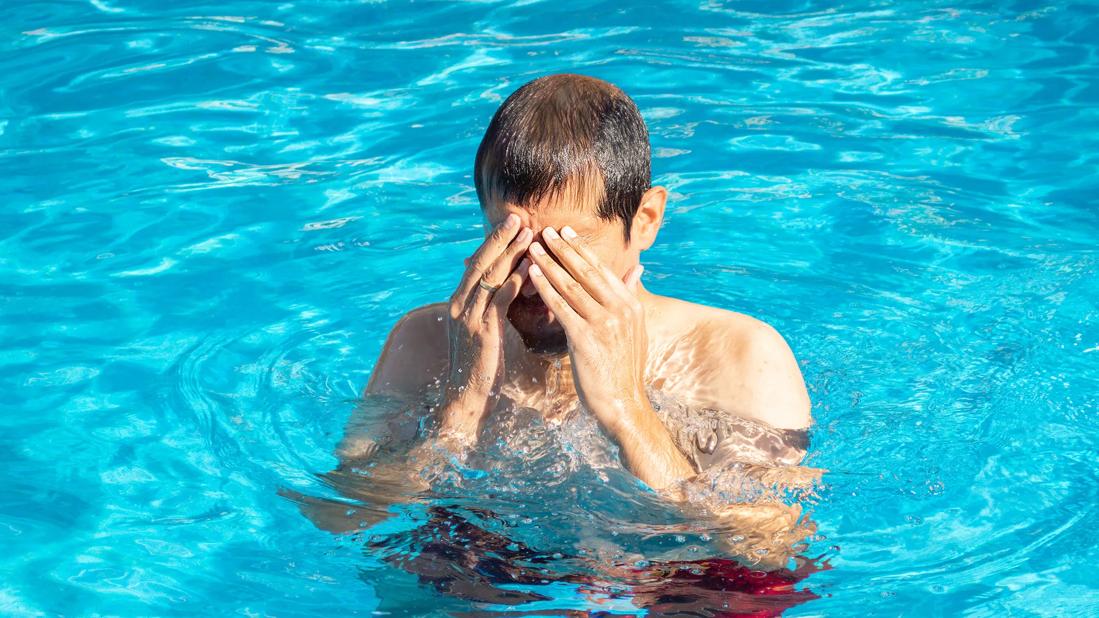To avoid swimmer’s eye, wear goggles, use eye drops and flush out your eyes with fresh, clean water when irritated

It can be a lot of fun spending your summer at the pool. But if chlorine leaves your eyes burning red, you might find the whole affair a bit of a drag.
Advertisement
Cleveland Clinic is a non-profit academic medical center. Advertising on our site helps support our mission. We do not endorse non-Cleveland Clinic products or services. Policy
Ophthalmologist Craig See, MD, explains how and why swimmer’s eye happens and how you can find relief.
When chlorine gets into your eyes, it can cause chemical conjunctivitis — also known as swimmer’s eye. This temporary condition causes:
Chlorine is one of several chemicals used to keep private and public pools safe from germs and bacteria. And it can irritate different parts of your body, like your ears or your nose, throat and lungs.
But it’s not the chlorine itself that’s necessarily the problem. The pH of the pool water, a number that describes how acidic the water is, can have a big effect. This is something a pool technician should be checking frequently.
“Pool water is also ‘hypotonic’ relative to the eye, meaning it has a lower salt concentration than our tears,” explains Dr. See. “Because it’s hypotonic, water tends to move from the pool into the cells of the eye, causing them to swell.”
This is why we use saline solution to rinse our eyes or store contact lenses in instead of fresh water.
“Swimmer’s eye is thought to be caused by a combination of chemical conjunctivitis, dry eye and corneal swelling,” Dr. See continues. “You also have the risk of recreational waterborne illnesses if you swim in fresh water like a pond, lake, creek or river. These infections can seriously damage the eye.”
Advertisement
If your eyes are irritated and red after swimming, these tips can help:
If nothing else works, schedule an appointment with an eye care provider.
Swimmer’s eye usually clears up within a couple of hours. Dr. See says more severe cases might last a day or two, especially if you swim often and already have the grittiness of dry eyes. If you try at-home remedies for swimmer’s eye and your symptoms don’t go away after a couple of days, make an appointment with a primary care provider.
Swimmer’s eye is easily avoidable. Even avid swimmers can avoid getting chlorine in their eyes by following these tips:
“Protecting your eyes from damage is important at any age,” advises Dr. See. “If you make time to keep your eyes healthy and clean, swimming underwater can be an enjoyable experience.”
Advertisement
Learn more about our editorial process.
Advertisement

Start training with full-body workouts at least six to eight weeks before you hit the slopes

Keep kids safe while they swim by staying vigilant and setting up a safe pool environment

Having a well-rounded, healthy nutrition plan is just as important as staying consistent with your exercise routine

Building your endurance and confidence, plus giving yourself plenty of time, are key

Concussion protocol describes the steps needed to test for concussion and return to play — timelines vary

The mental block is a brain-body disconnect that causes gymnasts to lose their sense of space on flips

A more open conversation on athletes and their mental health needs is overdue

You can reduce your risk by not swallowing water, and showering before and after swimming

Wearing a scarf, adjusting your outdoor activities and following your asthma treatment plan can help limit breathing problems

Your diet in the weeks, days and hours ahead of your race can power you to the finish line

When someone guilt trips you, they’re using emotionally manipulative behavior to try to get you to act a certain way